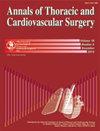肌肉质量预测早期非小细胞肺癌手术后预后
IF 1.3
4区 医学
Q4 CARDIAC & CARDIOVASCULAR SYSTEMS
引用次数: 3
摘要
目的:本研究旨在探讨骨骼肌质量对早期非小细胞肺癌癌症(NSCLC)手术患者预后的影响。方法:回顾性分析98例病理I~II期NSCLC患者行肺叶切除术或节段切除术的临床资料。与骨骼肌数量一起,通过第一腰椎水平的肌内脂肪组织含量(IMAC)来评估肌肉质量;IMAC越高表示骨骼肌质量越低。根据IMAC的性别特异性四分位数,将患者分为两组,并研究IMAC对预后的影响。结果:高IMAC患者和正常IMAC患者的身体和骨骼质量指数(表示骨骼肌数量)没有显著差异。IMAC高的患者(n=23)的总体生存率和疾病特异性生存率明显低于IMAC正常的患者(n=75;分别为P<0.001和P=0.048)。在包括其他临床病理因素的双变量分析中,高IMAC与较差的总生存率独立相关。结论:IMAC评估的骨骼肌质量可用于预测早期NSCLC手术后的生存风险。本文章由计算机程序翻译,如有差异,请以英文原文为准。
Muscle Quality Predicts Outcomes after Surgery for Early-Stage Non–Small-Cell Lung Cancer
Purpose: This study investigated the impact of skeletal muscle quality on the outcomes of patients undergoing surgery for early-stage non–small-cell lung cancer (NSCLC). Methods: A total of 98 patients with pathological stage I–II NSCLC who underwent lobectomy or segmentectomy were retrospectively analyzed. Along with skeletal muscle quantity, muscle quality was evaluated by intramuscular adipose tissue content (IMAC) at the first lumbar vertebral level; a higher IMAC indicates lower skeletal muscle quality. Patients were divided into two groups according to the gender-specific quartiles of IMAC, and the prognostic impact of IMAC was investigated. Results: No significant differences in the body and skeletal mass indices, which indicate skeletal muscle quantity, were observed between patients with high and those with normal IMAC. Patients with high IMAC (n = 23) showed a significantly poorer prognosis in overall and disease-specific survivals than those with normal IMAC (n = 75; P <0.001 and P = 0.048, respectively). In a bivariate analysis that included other clinicopathological factors, a high IMAC was independently associated with worse overall survival. Conclusion: The skeletal muscle quality evaluated by IMAC could be used to predict survival risk after surgery for early-stage NSCLC.
求助全文
通过发布文献求助,成功后即可免费获取论文全文。
去求助
来源期刊

Annals of Thoracic and Cardiovascular Surgery
CARDIAC & CARDIOVASCULAR SYSTEMS-SURGERY
CiteScore
2.80
自引率
0.00%
发文量
56
审稿时长
4-8 weeks
期刊介绍:
Information not localized
 求助内容:
求助内容: 应助结果提醒方式:
应助结果提醒方式:


